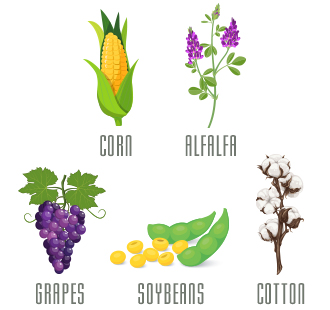Free Case Evaluation
You will never be charged a fee unless a recovery is made for you.
Trustwell Law is accepting cases on behalf of people who personally mixed or sprayed paraquat and have been diagnosed with Parkinson’s disease or are under a doctor’s care for the symptoms of Parkinson’s. We are not accepting cases on behalf of people exposed to paraquat indirectly.
If you are considering filing a paraquat lawsuit, call us at 800-796-1636 or submit your case details online and someone will contact you shortly. You pay nothing unless your lawsuit is successful and you receive compensation.

At Trustwell Law, our experienced attorneys take a personalized, compassionate approach. We cut through the legalese and partner with our clients. We have access to the expertise, resources, and manpower to fully investigate each case and fight for and with our clients to get the justice they deserve.
Paraquat is a toxic chemical used as an herbicide to kill unwanted plants and vegetation. Although it is more than 130 years old, it was not widely used until the middle of the twentieth century. It was first released in the U.S. in 1964. Paraquat is marketed throughout the U.S. under various brand names, including Cyclone, Helmquat, Parazone, and Gramoxone, which is sold by the agricultural company Syngenta.
Primarily used as a spray, paraquat is highly toxic. It is dangerous to breathe or swallow or even if it comes in contact with a person’s skin. Swallowing even small amounts of paraquat can be lethal. Because paraquat is highly poisonous, the forms marketed in the United States are dyed blue to prevent confusion with beverages, are formulated to have a sharp odor to serve as a warning, and include an added agent to force vomiting if someone drinks it.
Research has found that paraquat exposure greatly increases a person’s risk of developing Parkinson’s disease, and that ongoing exposure to paraquat can also damage brain cells and lead to kidney, heart, and liver failure as well as lung scarring and pulmonary edema.
Paraquat is banned in more than 50 countries around the world. It is not banned in the U.S., but the Environmental Protection Agency (EPA) designates paraquat as a “restricted-use product” and requires anyone applying it to be certified and trained using an EPA-approved training program.
Paraquat is used to control weeds and invasive grasses and is used on more than 100 crops in the United States. The most common crops paraquat is used on include:

Paraquat is also widely used to control weeds in orchards and in pastures.
The states in which paraquat is most commonly used include:
Strong scientific evidence links paraquat exposure to Parkinson’s disease. Numerous studies have shown this connection. One such study found that paraquat users developed Parkinson’s disease 2.5 times more often than nonusers. Another study found that people exposed to paraquat while in their teens or as young adults had a 200 to 600 percent greater risk of developing Parkinson’s; the longer the exposure, the greater the risk.
Parkinson’s disease is an irreversible degenerative neurological disorder. There is no cure. Parkinson’s disease is progressive, with symptoms becoming worse over time. Parkinson’s impairs movement and muscle control, and it may also lead to dementia and mental impairments over time.
Symptoms of Parkinson’s disease include:
If you or a loved one personally mixed or sprayed paraquat, have been diagnosed with Parkinson’s disease or are under a doctor’s care for the symptoms of Parkinson’s, and are considering filing a paraquat lawsuit, contact us. The consultation is free.
For news and updates regarding the Paraquat litigation, visit our Paraquat Litigation Tracker.
Sources
Boose, K. (2021, April 2). The Hidden Health Risks of Paraquat. Retrieved from https://www.legalexaminer.com/environment/the-hidden-health-risks-of-paraquat/
Centers for Disease Control and Prevention. (2018, April 4). Facts About Paraquat. Retrieved from https://emergency.cdc.gov/agent/paraquat/basics/facts.asp
Gotter, Ana. (2018, September 16). Paraquat Poisoning. Retrieved from https://www.healthline.com/health/paraquat-poisoning
Gatto, N., et al. (2009, July 31). Well-Water Consumption and Parkinson’s Disease in Rural California. Retrieved from https://www.ncbi.nlm.nih.gov/pmc/articles/PMC2799466/
Hakim, D. (2016, December 20). This Pesticide Is Prohibited in Britain. Why Is It Still Being Exported? Retrieved from https://www.nytimes.com/2016/12/20/business/paraquat-weed-killer-pesticide.html
Leyva, M. (2021, April 1). EPA Decides Not to Ban a Pesticide Despite Strong Links to Parkinson’s Disease. Retrieved from https://www.legalreader.com/epa-decides-not-to-ban-a-pesticide-despite-strong-links-to-parkinsons-disease/
Meyer, B. (2019, July 29). New Legislation Seeks to Ban Pesticide Linked to Parkinson’s. Retrieved from https://www.michaeljfox.org/news/new-legislation-aims-ban-herbicide-linked-parkinsons
Ray, F. (2021, February 3). Inhaled Paraquat Found to Enter Brain, Affecting Sense of Smell in Male Mice. Retrieved from https://parkinsonsnewstoday.com/2021/02/03/inhaled-paraquat-found-to-enter-brain-affecting-sense-of-smell-in-male-mice/
Tanner, C. et al. (2011, June 1). Rotenone, Paraquat, and Parkinson’s Disease. Retrieved from https://ehp.niehs.nih.gov/doi/10.1289/ehp.1002839#t1
U.S. Environmental Protection Agency. (2016). Paraquat Dichloride Training for Certified Applicators. Retrieved from https://www.epa.gov/pesticide-worker-safety/paraquat-dichloride-training-certified-applicators
U.S. National Library of Medicine. (2021, February 26). Paraquat poisoning. Retrieved from https://medlineplus.gov/ency/article/001085.htm
U.S. Right to Know. (2021, March 25). Paraquat Papers. Retrieved from https://usrtk.org/pesticides/paraquat-papers/
You will never be charged a fee unless a recovery is made for you.